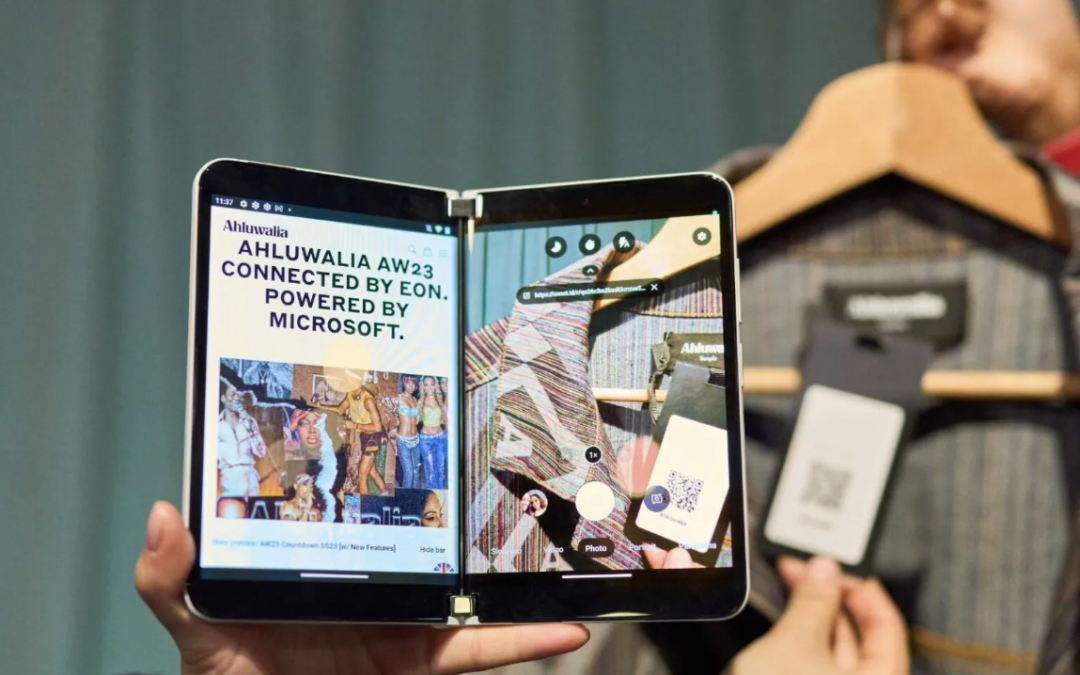Article from Business News
The fusion between fashion and technology has taken a new form at this year’s London Fashion Week. The digital clothing tag was shown backstage at the Ahluwalia show in February, containing a QR code that provides a bundle of information about the garment. The tag was developed in partnership with Microsoft and software platform EON, with the aim of improving traceability and enabling sphericity of clothing. Luxury brands such as Prada, Coach and Ralph Lauren are also looking to introduce digital product IDs to incorporate sustainable and technologically advanced practices into their businesses.
Circular fashion is a concept that brands increasingly strive to deliver. Circularity refers to the ability of clothing to be recycled and reused, which is important in reducing the environmental impact of the fashion industry. Fashion is one of the most polluting industries on the planet, producing 20% of global wastewater and 10% of all greenhouse gas emissions. The booming used clothing market is estimated to be worth $350 billion by 2027. A recent report by the United Nations Climate Change and the CDP shows that the fashion industry is finally making concrete changes to achieve sustainability and take action against climate change. However, greenwashing is still prevalent when it comes to high street labels, and fast-fashion presents enormous challenges. Wear-then-throw fashion is still a major issue, with 92 million tons of clothing ending up in landfill every year. By 2030, this number is projected to increase to 134 million tons of waste annually.
Many in the fashion industry believe that technology such as Digital ID has the potential to effect change. Tags act as a passport of sorts for a garment, providing a holistic, end-to-end overview for the product. They ultimately provide a blueprint to resell, repair, and recycle, which are some of the most eco-friendly strategies when it comes to fashion. Digital IDs can turn “simple products” into “traceable and valuable assets”, providing customers with in-depth information on where and how they were made, or access to services such as styling, care, repair, resale and more We do. These pieces of “embedded information” turn pieces of clothing into smart garments, which can specifically support brands and people entering the resale market.
EON is developing an instant resale program through which users can scan their product’s digital ID and resell immediately. The startup is currently working with French luxury brand Chloé and fashion resale site Vestiaire Collective on this initiative. Maruska Lobser, director of global partnerships at Microsoft, says that digital ID tags are “an important part of the future of fashion” because of their potential to creatively promote circularity. “Digital ID enables certified resale, rental and service business models – turning products into service,” explains Lobser. “In general, if a garment is smart it allows for multiple interactions to move it from a linear business model to a circular one – it also enables garment transparency whether it is being resold, rented recovered, recycled or upcycled.”
The ubiquity of these tags is increasing. The European Union proposed a standardized practice of digital passports for textiles last March, one aspect of its circular economy action plan that is part of the EU’s 2050 climate neutrality target and the European Green Deal. However, consumer attitudes may have to change. The Sustainability Consortium conducted a 2020 study that concluded, “Digital tags can measure the frequency and duration of clothing use with reasonable reliability.” The organization found that there were some barriers to expanding the idea more widely, but consumer attitudes toward these tags became increasingly positive. Yoox Net-A-Porter Group, a global online retailer that also worked with EON to “accelerate cyclability”, found in its research that customers are increasingly engaged with information provided via tags .
EON founder and CEO Natasha Frank says brands that adopt technology in this way will be able to “outperform others” in the area of sustainability. She also believes that the potential for this technology is massive for development in other venues, with the potential to link products to “digital wardrobes, gaming and emerging technologies like metaverse apps, NFTs and more.” “Brands that are successful move beyond selling ‘ordinary products’ to selling ‘intelligent assets,’” she says. “The possibilities are endless, and there’s still so much to innovate.”

